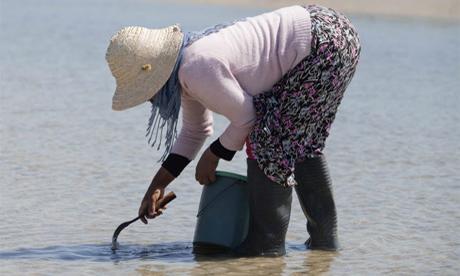Lifting the veil on Tunisia’s clam fisheries
FAO and its partners are actively strengthening the role of women in the beach clam fisheries subsector.

Beach clam fisherwoman hard at work [FAO/G. Napolitano]
The interval between the gathering and local sale of clams in the Mediterranean port of Skhira, 300 km south of Tunis close to the industrial city of Sfax, and their export to Rome or Madrid, is a mere 48 hours. However, a wide gulf separates the Tunisian woman who gathers these valuable shellfish by hand and a restaurant owner in Rome: while a fisher receives a little over 1 euro per kilo (3 Tunisian dinars) for the clams she digs, a restaurateur will earn 10 to 15 times that amount.
Most rural women living around the Gulf of Gabes derive their main livelihood from beach clam fishing. FAO fishery industry expert, Yvette Diei Ouadi, explains that FAO is supporting the Tunisian Government in a participatory strategy-development process to strengthen the role of women in the clam subsector with the aim of maximizing their income and sustaining clam stocks, in particular by paving the way for other development activities.
Despite her robust constitution, one beach clam fisher, Saliha, complains: “Beach clam fishing is gruelling. Every day, we walk long distances at low tide, bent over in a very uncomfortable position under a blazing sun, standing in mud or up to the knees in icy sea water.”
“The clams we harvest for direct sale are landed in the port out in the open, with no shelter to protect women from possible bad weather during our transactions with middlemen who show little respect for our efforts,” adds Agla, one of Saliha’s companions.
A coveted but inequitable resource
The Gulf of Gabes in southern Tunisia is a particularly rich fishing area. The most productive areas are in the Governates of Sfax and Gabes, where a large proportion of the local population earns its living primarily from coastal fisheries. This wetland is known for its natural beds of carpet shells and razor clams, bivalve molluscs of the clam family. Foreign demand for clams is growing steadily.
Over the past five years, production has averaged 500 tonnes, worth 1.9 million Tunisian dinars (1 million euros), or nearly 1 percent of the value of domestic fishery production during the same period. Southern Tunisia is responsible for 98 percent of domestic clam production.
“If clam harvesting were managed responsibly, with fair and equitable distribution of income throughout the value chain, it could provide an excellent job opportunity for a disadvantaged sector of the population, as well as bringing significant foreign currency into the country,” points out Yvette Diei Ouadi.
“In Tunisia, clam-digging is an artisanal activity carried out mainly by rural women living a precarious and marginalized existence. To varying degrees, these groups of fisherwomen are exposed to a combination of factors that predispose them or exacerbate their vulnerability to poverty.”
Illiteracy, the periodic closure of production areas on health grounds, overfishing of clam stocks, the lack of any form of guidance or training and their exclusion from the market are all contributing factors.
Towards a community development plan
As part of a policy of gradual State withdrawal and to overcome numerous health, administrative and organizational challenges and build momentum around beach clam fisheries, clam development and harvesting groups (GDP) have been set up in production areas.
“Aware of the need to organize themselves to improve their working conditions, as well as to secure recognition for their role as upstream producers in the subsector and their effective contribution to family income generation, the majority of fisherwomen endorse the idea of forming groups,” explains FAO expert on gender issues, Ilaria Sisto.
“A formal local organization is needed that can help not only to develop clam harvesting, but also, and even more importantly, to ensure the sustainability of stocks and a more equitable distribution of profits between men and women. The organization must facilitate women’s participation in rural labour markets with flexible, efficient and equitable jobs. This has a positive impact on wellbeing, as well as on human capital formation and economic growth.”
The Tunisia/FAO technical cooperation project has three main components: training in proper clam digging and handling techniques; assistance to empower women; improving working conditions.
The project’s main objective is to improve the livelihoods of poor households and the food security of vulnerable groups living along the Mediterranean coast through the rational production and responsible use of wetland fishery resources (Convention on Wetlands of International Importance especially as Waterfowl Habitat/Ramsar Convention, 1971).
